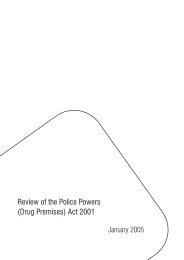Crimes (Forensic Procedures) Act 2000 - NSW Ombudsman - NSW ...
Crimes (Forensic Procedures) Act 2000 - NSW Ombudsman - NSW ...
Crimes (Forensic Procedures) Act 2000 - NSW Ombudsman - NSW ...
Create successful ePaper yourself
Turn your PDF publications into a flip-book with our unique Google optimized e-Paper software.
interest in upholding the physical integrity of the suspect. It also specifies a number of factors police must consider<br />
in conducting this balancing exercise, including the seriousness of the offence, the circumstances surrounding its<br />
commission, the degree of the suspect’s alleged participation, personal characteristics of the suspect (including<br />
age, health, cultural background), whether evidence of the suspect’s involvement in the offence can be gained in a<br />
less intrusive way, and other relevant matters. 515 The <strong>2000</strong> model bill for forensic procedures contained guidelines<br />
for balancing the competing public interests, but these were not ultimately included in the New South Wales <strong>Act</strong>. The<br />
model bill is discussed in detail in section 3.2 of this report.<br />
Some of the submissions we received raised concerns about forensic procedures being conducted in circumstances<br />
where they are not warranted. 516 Some recommended that guidelines be developed to assist police officers in<br />
determining whether a forensic procedure request is justified. 517 We note that the Legislative Council Standing<br />
Committee on Law and Justice has previously recommended that guidelines to assist police officers in determining<br />
whether a request of order for a DNA sample is justified in all the circumstances be inserted into the New South Wales<br />
<strong>Act</strong>. 518<br />
Despite the calls for further guidance about when a request for consent will be “justified in all the circumstances,”<br />
our research does not suggest this would be of significant value. While we did find instances of forensic procedures<br />
which appeared unwarranted, this was because other criteria were not satisfied, for example where the person<br />
was not a suspect, or there were no reasonable grounds for believing the procedure would confirm or disprove the<br />
suspect committed an offence. We also note that the discussion above only deals with whether a request for consent<br />
by a suspect to a forensic procedure is “justified in all the circumstances”. Whether conducting a forensic procedure<br />
in the absence of consent is justified raises very different issues, which we address below, at 7.2.6.<br />
7.2.4. Factors affecting whether a suspect consents to a procedure<br />
In our work scrutinising the operation of the <strong>Act</strong>, we identified a number of different factors which affected a suspect’s<br />
decision to consent to a forensic procedure, including:<br />
• a wish to cooperate with police<br />
• a desire to show the suspect has nothing to hide: “I’ve got nothing to hide and I know this will clear me... I'm<br />
innocent and forensics will prove that.” 519<br />
• a belief that there is no choice about the matter and the procedure will be conducted regardless: “I had to do<br />
it. You would get a sample anyway.” 520<br />
• the threat of being subjected to a more painful procedure, on the basis that police may order a hair sample be<br />
taken if a person does not consent to a buccal swab<br />
• fear that police may take a sample by force, and<br />
• the length of time spent in police custody and a desire to be released as soon as possible: “I want it done to<br />
get out of here.” 521<br />
Several submissions we received raised concerns about suspects undergoing forensic procedures without having<br />
given properly informed consent. Legal Aid <strong>NSW</strong> advised that:<br />
In general our clients do not sufficiently understand the nature of the procedure and their option not to consent...<br />
For example, clients often indicate that they were scared that police would forcibly take samples from them,<br />
which they try to avoid by consenting to the procedure. 522<br />
The <strong>NSW</strong> Department of Aboriginal Affairs similarly commented:<br />
There is anecdotal evidence that some police officers are advising suspects that if they don’t consent to a<br />
buccal swab the police have the power to use reasonable force to take a sample of growing hairs. In such<br />
cases a suspect would be misled as to their rights to decline to participate in DNA forensic procedures. 523<br />
Our monitoring of police suggests these concerns are well founded. In particular, we found that most police officers<br />
do not appreciate that the criteria for requesting consent and for making an order are quite different. First, to ask for<br />
consent to a procedure, the police officer need only suspect on reasonable grounds that the person has committed<br />
an offence. 524 But to order a procedure be carried out in the absence of consent, the police officer must be satisfied<br />
that “there are reasonable grounds to believe that the suspect committed an offence,” 525 which creates a much<br />
higher threshold. Although a reasonable suspicion involves more than a mere possibility, and must have some factual<br />
basis, it involves less than a reasonable belief. 526 Second, to ask for consent to a procedure, the police officer must<br />
be satisfied that “the request for consent to the procedure is justified in all the circumstances.” 527 However, to order a<br />
96<br />
<strong>NSW</strong> <strong>Ombudsman</strong><br />
DNA sampling and other forensic procedures conducted on suspects and volunteers under the <strong>Crimes</strong> (<strong>Forensic</strong> <strong>Procedures</strong>) <strong>Act</strong> <strong>2000</strong>

















